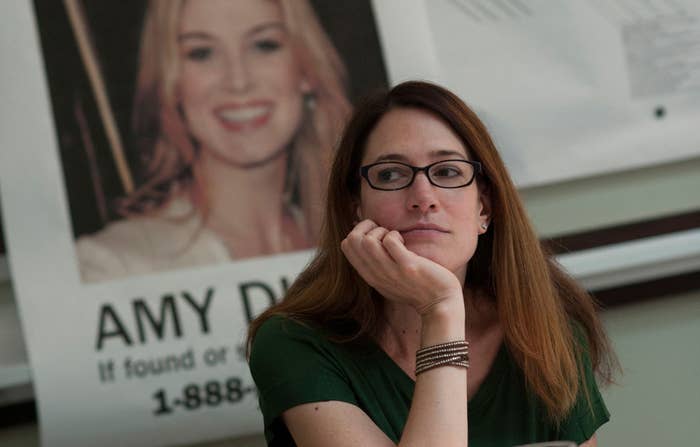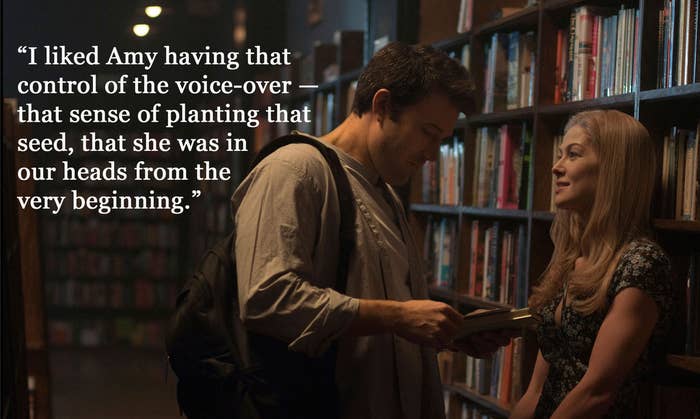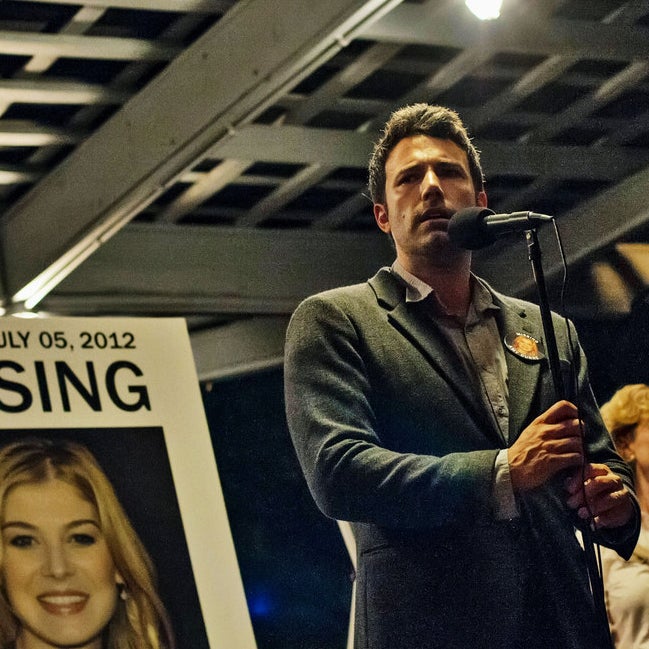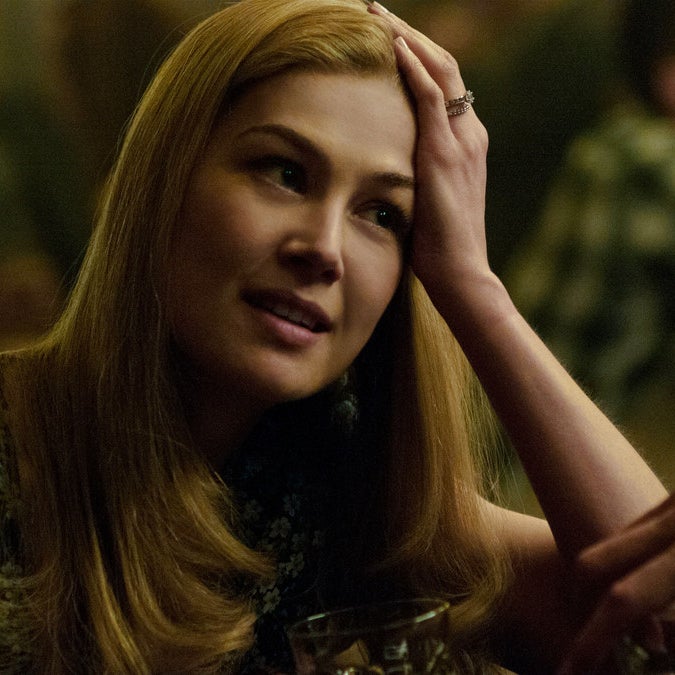
Like Gone Girl's suspect male protagonist Nick Dunne, played with fitting frat-boy-gone-to-seed handsomeness on screen by Ben Affleck, Gillian Flynn used to be an entertainment journalist. Before she adapted her best-selling third novel into a hugely anticipated movie directed by David Fincher that's now in theaters, she was a features writer and television critic at Entertainment Weekly — so she knows her way around an interview, even a slightly awkward one with someone who loved the book but felt uneasy about its cinematic adaptation.
It's not often that an author gets to be so involved in translating his or her work to film, but Flynn wrote the screenplay for Gone Girl herself, boldly reshaping and slimming down her novel into a movie about how Amy Dunne (Rosamund Pike) disappears on the fifth anniversary of her wedding to Nick, and about all the dark secrets that emerge in the investigation that follows. It's certain to be one of the most talked-about movies of the year, and Flynn, who's already teamed up again with Fincher on a U.S. adaptation of the British cult series Utopia for HBO, was happy to talk about it with BuzzFeed News, the day after Gone Girl's world premiere at the New York Film Festival.
There was talk early on that the ending of Gone Girl would be changed for the film, but what's there is very close to what's in the book. Was there ever actually any discussion of altering the ending?
Gillian Flynn: No. No, it came from a quote that got taken out of context of what David had said, then the aggregation sites picked it up and pretty soon it was being attributed to me, mashed together with another quote I'd said somewhere else. David and I had always been in a complete mind-set that that was how the ending was supposed to be. We liked it that way and it was the right one.
What was your process in fitting the novel into something feature-length? Did you look at it more as "what can I trim away" or "what do I need to keep"?
GF: More "what am I going to keep." That was the first thing I looked at — what absolutely needs to be here, plot-wise. You think you can get rid of one scene, and you realize down the road that now this is going to collapse because we haven't put that brick in there.
It was partly doing that, but also with a real mind to not turning it into a complete procedural. The plot could have just taken over. To me it was so important to have those Nick and Amy flashbacks, to see them all the way through the different stages of their marriage so that you're invested in them.
Obviously some scenes just feel iconic — like the sugar kiss. What was your approach in terms of what to keep from early in their marriage in New York?
GF: I knew I wanted to see them meet. And the way David has filmed it is the weirdest, most diabolical meet-cute ever. I love the cognitive dissonance of that scene, this cute, flirty banter — but the way they play it is not bouncy. It's not the way you're used to seeing a romantic comedy. Something's off.
I like the scene when Nick's been laid off. I feel like that's an important turning point. Some scenes had to be combined together. I had to create other scenes to do the work of what had been three or four diary chapters — otherwise it would have been the whole movie. I could have just stayed in there.

The book is defined by these dueling narratives of Nick's account in the present day and Amy's diary, which in the movie Pike narrates. Was there ever a consideration of something like, I don't know, voice-over for Nick?
GF: Yeah, I know you didn't like that.
I missed his voice.
GF: I didn't ever consider voice-over for Nick, because I felt like it could very easily turn into a book on tape. I beefed up [Nick's twin sister, played by Carrie Coon] Go's role a little bit, to give her some of those moments with him. But I also really wanted him to take on the role of us projecting our emotions onto him. I wanted him to feel more of a cipher, that Amy was hypnotically working her magic.
To me, he still felt like an unreliable narrator — you're still not quite sure why he's doing the things that he's doing, why he's checking the phone, why his emotions seem so off-kilter. Anyone who can joke with his sister that (laughs), "Anyone who took her will probably bring her back," something is a little bit off. But mainly I liked Amy having that control of the voice-over — that sense of planting that seed, that she was in our heads from the very beginning. So when you get to the reveal, you realize that she's been this presence who's been toying with you the whole time, and that she's really in control of this overarching narrative. And it does make her a little more villainous than in the book. It gives her a bit more power.
She felt more like a femme fatale to me in the movie.
GF: I think she's empathetic, because you see the flashbacks with her parents and any time you know where someone's come from, you tend to have more empathy for them. To me, "femme fatale" implies a sort of unknowability, and I think she's known. She's telling you what's going on. To me, they felt like equal players.
I felt like she's in control, and I wanted that sense that you're going to always have to be on your toes when Amy's around, even the audience. Because she's tricked you, because she's been in your head and been playing with you, the audience member, that you have a feeling for Nick in a way.
The "Cool Girl" section in the book has really resonated with people and taken on a life of its own, and a version of it is part of a pivotal moment in the movie as well. Did you expect that kind of response when you wrote it?
GF: It's funny — that "Cool Girl" speech started just as a writing exercise. I was trying to figure out who Amy was, and at the time when I was writing it, she didn't write quizzes; she was more a female issues writer for a women's magazine. I wrote that all in one day in this fugue state, just sweating and angry, it all poured out of me. Normally, as a rule, I don't try to wedge my writing exercise stuff into a book, because it's unhealthy to do that. But that one I just liked so much — I put it in, took it back out, put it back in, and finally was like, fuck it, it's too good, I'm going to put it in there.
But I had no idea... it really does seem to resonate with people. The cool thing about working with David, I think a lot of directors would have seen three pages of a script of pure voice-over and been like "absolutely not." But he was like, great, we got it, that's awesome. He totally was into it, and making that that turning point where you're first really meeting Amy.


It speaks to Amy and her sense of self, or lack thereof, but it feels like this broader post-feminist complaint — that there's this image of this girl that looks very free, chili cheese fries and comic books, that can in reality be just as restricted as Scarlett O'Hara having a meal before going to dinner, so she looks like someone who doesn't really eat.
GF: Totally. I remember first thinking that back in the '90s — and I think a bit of this is in the book — when I would go to strip clubs with guys. And they would go, "You're the coolest girl in the room! You just became the hottest girl by coming to the strip club!" I had that moment of, what the fuck am I doing? I don't want to be your ideal if this what I'm doing.
I'm not going to the strip club for myself — I'm doing it as a performance art piece. And how ridiculous that was, what women do to be the cool girl, the things we put ourselves through. They feel freeing, but if you're not doing it because you enjoy it, it's really just as constricting as it would be to strap yourself into a girdle.
Do you see Amy as mentally ill? Or do you feel that's a useful way to describe her?
GF: Well, anyone who does what she does is not a well person. But I didn't write her from that point of view at all, and to me it's important that I wrote her from an empathetic place. That's why I included so much of her childhood, her inner thoughts.
I think her central argument is something that does resonate — that idea that if you have sold yourself to me as a certain person, and I have sold myself to you as a certain person, we must live up to that. Why wouldn't you try to be your best self for the person you love the most, instead of the shoddy version you've hidden from them? She's obviously a very strident version of it, but I think everyone can understand why she's so pissed, at least, if not what she does with the pissiness.
Amy is someone who understands, as you've put it, all the tropes. She understands perceptions of femininity. That said, she is in some ways a men's rights activist's perfect affirmation — she fakes victimization, she fakes rape. And some people won't see past that.
GF: Obviously, I'm not holding her up as a mirror of how people should act. She is not a nice person. To take offense at her machinations is a little bit beside the point. It's not holding her up as a model of female empowerment. She is a shark. She's relentless, looking for the next meal, looking for the next feed, looking for blood. She's pure machine, and she's going to use whatever she can. I do like the perversity of someone who takes all the tropes that we've been bound by, that have been projected on us, and uses them to fuck with people.


At the festival press conference, Rosamund Pike said that Amy felt distinctly female to her, which is something I've also thought about the character, particularly in that part of her plan, at least initially, involves killing herself. There's something about including that self-immolation as part of a revenge scheme that seems not male at all.
GF: Rosamund and I have had conversations about that, and I think that's very well pointed out. Her violence, her anger is a very female form, and that's what I've always been interested in portraying, from Sharp Objects on, is the particularly female brand of psychological violence, which is very different from a male, and scarier, I think, often.
I think that women really entwine with the people that they become close to in a way that men don't — and so, when they are forced to disentwine, you can't remove the vines without doing some damage. I think women do have that fatal streak to them that's partly because it's been romanticized, the martyr complex — "Look what you did to me!"
How do you imagine them as parents, Nick and Amy?
GF: (laughs) I do feel like I might have to dip back in on them in 10 years and see what they've wrought. Nothing good. The problem is they're inherently selfish people. They ultimately stay conjoined for selfish reasons. They are addicted to each other, in a way, and who they are and who they're reflected back to each other as.
You have to be pretty selfless to have a child, who doesn't give a lot back to you. I have two kids, and anyone who has a kid in order to feel loved is going to be in trouble, because kids are first and foremost all about themselves. They'll say they love you, but 10 seconds later they'll turn on you.
That idea of the reflected glory that people think they're going to get from kids... Amy in particular is going to find that very, very difficult.
This interview has been edited and condensed.
